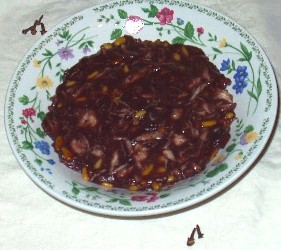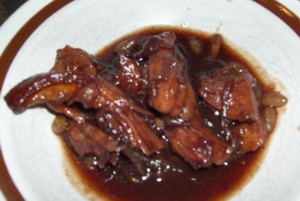Mawmenee (recipe)
From Cunnan
Jump to navigationJump to search
Period Recipe
From the Forme of Cury.
- Mawmenee. XX.
- Take a pottel of wyne greke. and ii. pounde of sugur take and clarifye the sugur with a qantite of wyne an drawe it thurgh a straynour in to a pot of erthe take flour of Canell. and medle with sum of the wyne an cast to gydre. take pynes with Dates and frye hem a litell in grece o�er in oyle and cast hem to gydre. take clowes an flour of canel hool and cast �erto. take powdour gyngur. canel. clower, colour it with saundres a lytel yf hit be nede cast salt �erto. and lat it see�; warly with a slowe fyre and not to thyk, take brawn of Capouns yteysed. o�er of Fesauntes teysed small and cast �erto.
Notes
- Mawmenee. Vide No. 194, where it is called Mawmenny.
- pottel. Half gallon
- Flour of Canell. Cassia buds. The transcription in Curye on Inglysch Part IV no. 22 makes it clear that in its first appearance in this version of the recipe it took the place of "flour of rys" (rice flour).
- medle. Mix.
- pynes. Pine nuts
- clowes. Cloves.
- hool. Whole. This seems to support the above gloss of flour as meaning flowers or buds.
- warly. Warily, gently.
- not to thyk. So as to be not too thick; or perhaps, not to thicken.
- brawn. Breast meat. Few Capons are cut now except about Darking in Surry; they have been excluded by the turkey, a more magnificent, but perhaps not a better fowl.
- yteysed, or teysed, as afterwards. Pulled in pieces by the fingers, called teezing No. 36. This is done now with flesh of turkeys, and thought better than mincing. Vide Junius, voce Tease.
Modern Recipe 1

Serves about 4 people as part of an ordinary meal, many more as part of a full feast
Ingredients
- 1/2 lb. boneless capon breast (or chicken or pheasant)
- 1/4 tsp. sea salt
- 2 oz. pine nuts
- 6 dates, cut in pieces about the size of peas
- 2 Tbsp. lard and/or oil (such as olive or rapeseed/Canola)
- slightly heaping 1/2 c. mild, light-colored granulated sugar
- 2 Tbsp. white rice flour
- 1 c. sweet, tasty red wine
- 6-8 small whole cloves
- 6-8 cassia buds (use up to a dozen cloves if you have no cassia buds)
- 1/2 tsp. ground cinnamon (cassia)
- 1/2 tsp. ground ginger
- 1/4 tsp. ground cloves
- 1/2 tsp. ground saunders
- sea salt to taste (maybe about 1/4 tsp.)
- a bit of extra wine
Method
- Simmer meat in salted water to cover, until done. Let cool until slightly hot, drain meat (reserving broth for other uses), and shred by pulling into strips and tearing the strips into bite-sized (or smaller) chunks. Remove any tough connective tissue.
- If the dates are very dry, plump them a bit, using no more hot water than they can absorb while still remaining firm. Stir as needed to mix the dates into the water.
- Heat fat over medium high heat, then add pine nuts and stir, then add dates and fry briefly, stirring frequently, until nuts are lightly browned. Do not let the nuts cook dark brown. (If you want to be careful, use medium heat.)
- Mix sugar and rice flour in a saucepan. Pour in about a quarter of the wine, stir, then add the rest. Heat to a slow boil, stirring occasionally, then immediately add the nuts and dates with the fat, and the whole spices. Return to a boil, then add all remaining ingredients including the shredded meat, and simmer for a few minutes, stirring frequently as needed to prevent sticking on the bottom. If it thickens to where it stands rather than mounding, add more wine.
- Plate it while hot, spread it flat in the plate, then smooth the top by patting it down with a saucer or broad spoon dipped in wine, dipping it repeatedly in the wine so it doesn't start sticking. Serve it forth to pottage at the beginning of a course.
Notes
To convert this to the scale of the Forme of Cury recipe, multiply by 8.
Some variations:
- Omit whole cloves and cassia buds, increasing the amount of ground cloves.
- Reduce or omit saunders if satisfied with the color.
Modern Recipe 2
Ingredients
- 4 cups Red Wine
- 1 1/2 cups white Sugar
- 1 tsp Cinnamon
- 2 cups Dates
- 70 grams Pine Nuts
- 1/4 tsp Mace
- 1/2 tsp Cloves
- 1/2 tsp Ginger(may substitute Galingale)
- 1 tsp cinnamon (added twice)
- a pinch of salt
- 4 Chicken Breasts - or - leftover roast chicken
Method
- Using modern wine and sugar, there is no need to clarify the sugar or strain the wine. Mix the sugar, wine, and 1 tsp cinnamon together, preferably in an earthenware pot (or stainless) and let gently simmer. Reduce about 1/3.
- While the wine is simmering, cook your chicken. You cook chicken specifically for this recipe, or use leftover roast (which may give a deeper flavour if the roast is done with herbs/seasoning - just be sure they blend.
- Saute the dates in butter until they begin to soften. Remove them from the pan and add the pine nuts to lightly toast them. Combine the dates and pine nuts with the remaing spices (including the additional tsp cinnamon) and add to the wine mix. Allow to simmer for a while until it looks done (say roughly 20 mins to 1/2 hour).
- Tear the chicken into bite sized pieces with your fingers and add to the wine mix. You can let the chicken 'stew' in the wine mix so it really penatrates the chicken or if you're not a red wine and spice fan, add in the chicken and serve immediately.
Gwir verch Madog
Modern recipe 3
Notes
- I've made this several times, most recently for a large dinner party, and have a few notes to give.
- I've found Merlot to be the best substitute for the Greek wine required by the recipe.
- The redaction doesn't have enough sugar, the recipe calls for 2 pounds of sugar to 1/2 gallon of wine. The quart of wine used should be coupled with 2 to 2 1/4 cups of sugar (16oz or 450g by weight).
- The recipe above seems slanted in favor of a lot of sauce per quantity of meat. When you add the meat to the sauce, if you stir it and let it simmer for a few minutes to mingle, it works just fine with a much smaller proportion of sauce to chicken.
- Two roaster chickens, 500ml (about 2 cups) of wine and 1 cup of sugar will serve 16 if it isn't the only thing on the table. At home I serve this over rice. At a feast, served over some sort of grain you'll easily get one table of 8 to 10 per chicken, provided you're having more than one course. The full original recipe can make 8 chickens worth of meat, serving 80 people, and is very economical.
- This dish can also be made early in the day and set in a warm (170-180 degree) oven in a deep tray, covered, to keep warm until feast.
- The amount of pine nuts and dates (and all spices, for that matter) are to your taste. I use two to three times as many pine nuts and half as many dates as the recipe above.
Brochfael the Anglespurian
- On the contrary, there is no need for this potage to contain a large amount of flesh. It is the above note about using extra chicken that is "slanted". In period menus, mawmenny would have come at the beginning of a course containing several roasts or other such foods that are mostly flesh.
Notes
- The historical version of this recipe was taken from the Project Gutenberg e-text of the Forme of Cury.
